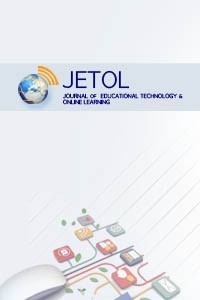Factors influencing EFL students’ motivation in online learning: A qualitative case study
Factors influencing EFL students’ motivation in online learning: A qualitative case study
online, motivation case study, student perceptions,
___
- Baker, C. (2010). The impact of instructor immediacy and presence for online student affective learning, cognition, and motivation. Journal of Educators Online, 7(1), n1.
- Barbour, M. K., & Reeves, T. C. (2009). The reality of virtual schools: A review of the literature. Computers & Education, 52(2), 402-416.
- Baxter, P., & Jack, S. (2008). Qualitative case study methodology: Study design and implementation for novice researchers. The Qualitative Report, 13(4), 544-559.
- Burston, J. (2003). Proving IT works. CALICO journal, 219-226.
- Campbell, C., & Sarac, B. (2018). The role of technology in language learning in the twenty-first century: Perspectives from academe, government, and the private sector. Hispania, 100(5), 77-84.
- Chen, K. C., & Jang, S. J. (2010). Motivation in online learning: Testing a model of self-determination theory. Computers in Human Behavior, 26(4), 741-752.
- Çebi, A., Güyer, T. Students’ interaction patterns in different online learning activities and their relationship with motivation, self-regulated learning strategy and learning performance. Educ Inf Technol (2020).
- De Barba, P. G., Kennedy, G. E., & Ainley, M. D. (2016). The role of students' motivation and participation in predicting performance in a MOOC. Journal of Computer Assisted Learning, 32(3), 218-231.
- Dikilitaş, K., & Bostancıoğlu, A. (2019). Inquiry and Research Skills for Language Teachers. Springer Nature.
- Dincer, A., & Yesilyurt, S. (2017). Motivation to Speak English: A Self-Determination Theory Perspective. PASAA: Journal of Language Teaching and Learning in Thailand, 53, 1-25.
- Dornyei, Z., & Ryan, S. (2015). The psychology of the language learner revisited. Routledge.
- Dörnyei, Z. (1994). Motivation and motivating in the language foreign language classroom. The Modern Language Journal, 78 (3), 273-284.
- Dörnyei, Z. (2020). Innovations and Challenges in Language Learning Motivation. Routledge.
- Hartnett, M. (2016). The importance of motivation in online learning. In Motivation in online education (pp. 5-32). Springer, Singapore.
- Hartnett, M., St George, A., & Dron, J. (2011). Examining motivation in online distance learning environments: Complex, multifaceted, and situation-dependent. International Review of Research in Open and Distributed Learning, 12(6), 20-38.
- Hedge, T. (2001). Teaching and learning in the language classroom (Vol. 106). Oxford, England: Oxford university press.
- Kyewski, E., & Krämer, N. C. (2018). To gamify or not to gamify? An experimental field study of the influence of badges on motivation, activity, and performance in an online learning course. Computers & Education, 118, 25-37.
- Li, L. Y., & Tsai, C. C. (2017). Accessing online learning material: Quantitative behavior patterns and their effects on motivation and learning performance. Computers & Education, 114, 286-297.
- Lin, C. H., Zhang, Y., & Zheng, B. (2017). The roles of learning strategies and motivation in online language learning: A structural equation modeling analysis. Computers & Education, 113, 75-85.
- Lumsden, L. S. (1994). Student Motivation. Research Roundup, 10(3), n3.
- Murday, K., Ushida, E., & Ann Chenoweth, N. (2008). Learners' and teachers' perspectives on language online. Computer Assisted Language Learning, 21(2), 125-142.
- Özhan, Ş. Ç., & Kocadere, S. A. (2020). The effects of flow, emotional engagement, and motivation on success in a gamified online learning environment. Journal of Educational Computing Research, 57(8), 2006-2031.
- Richardson, J. C., Koehler, A. A., Besser, E. D., Caskurlu, S., Lim, J., & Mueller, C. M. (2015). Conceptualizing and investigating instructor presence in online learning environments. The International Review of Research in Open and Distributed Learning, 16(3).
- Rubio, F. (2013). The Effects of Blended Learning on Second Language Fluency and Proficiency. AAUSC 2012 Volume--Issues in Language Program Direction: Hybrid Language Teaching and Learning: Exploring Theoretical, Pedagogical and Curricular Issues, 137.
- Ushida, E. (2005). The role of students' attitudes and motivation in second language learning in online language courses. CALICO journal, 49-78.
- Yantraprakorn, P., Darasawang, P., & Wiriyakarun, P. (2018). Self-efficacy and Online Language Learning: Causes of Failure. Journal of Language Teaching and Research, 9(6), 1319-1329.
- ISSN: 2618-6586
- Yayın Aralığı: Yılda 3 Sayı
- Başlangıç: 2017
- Yayıncı: Gürhan DURAK
Reflective writing in the pandemic period: A university students’ reflection
Herli SALİM, Susulawati SUSİLAWATİ, Muhammad HANİF
The future of education according to the fourth industrial revolution
Competition-based learning of blockchain programming
Melody KAUMBA, Ramashego Shila Shorty MPHAHLELE, Gistered MULEYA, Francis SİMUİ
Factors influencing EFL students’ motivation in online learning: A qualitative case study
